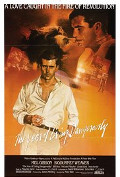
Directed by
Peter Weir
115 minutes
Rated PG
Reviewed by
Bernard Hemingway

The Year Of Living Dangerously
The Year of Living Dangerously was effectively Peter Weir’s ticket out of Australia as it was the last “Australian” film that he made before moving to the U.S.
It has three main elements: the setting of the fall of the Sukarno government in Indonesia in the mid-‘60s; the relationship between the central character, ambitious journalist Guy Hamilton (Mel Gibson, devilishly handsome and also about to go Stateside) and empathetic press photographer Billy Kwan (Linda Hunt) and the passionate romance between Guy and British diplomatic aide, Jill Bryant (Sigourney Weaver). The film waxes and wanes as it moves between these threads without really resolving into a satisfying whole.
Based on a novel by C. J. Koch, the Graham Greene-ish story sets the personal (First World) upheavals of Guy as his loyalties and values are tested against a background of intense political (Third World) upheaval as one power bloc is supplanted by another (Sukarno and the communists by Suharto and the military. As such it has the ingredients for a larger-than-life drama but, understandably enough, Weir who wrote the script with the author and David Williamson, seems overwhelmed by the material, committed on the one hand to historical accuracy but also toying with a steamy melodrama.
In this respect he does a good job in setting the scene, the poverty and superstition of the Indonesian peasantry, the vulgarity of the international press, the approaching civil breakdown and its threat to Westerners and so on but when it comes to the torrid romance it barely gets going before it fizzles out as Guy’s ambition wins out over his love for Jill (though we do get let out with a happy ending). In the middle is Billy, fated by life to be an outsider, his real role being to stitch the film’s other two aspects together, alternately facilitating and encouraging the romance and articulating the larger themes at stake, both personal and political. Why he is played by a female is a mystery as it requires us to constantly suppress the desire to ask.
FYI: Weir's film was released the same year as John Duigan’s Far East which similarly was a romance-cum-political drama set in South-East Asia but arguably a more satisfying one because less bound down by a perceived need for socio-historical contextualizing.
Want something different?





